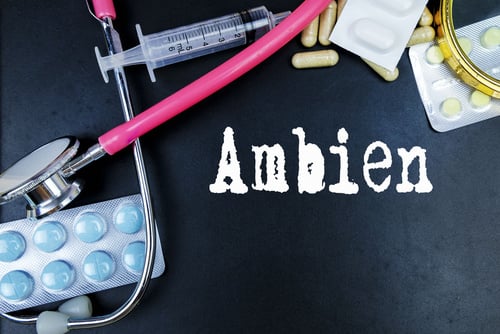How Much Ambien Do I Need To Trip?
Ambien (generically known as zolpidem) is a central nervous system depressant used to treat certain sleep problems, such as insomnia. Ambien comes as a tablet in 5 mg and 10 mg dosages, both in immediate release and extended-release forms. It works by acting on certain neurotransmitters in one’s brain, specifically the GABA-A (gamma-aminobutyric acid-A). When Ambien binds to this receptor it elicits a calming effect as it slows down excessive brain activity and inhibits the specific brain activity associated with insomnia. The average half-life, meaning the length of time the substance will remain in one’s system until the concentration in one’s blood has been reduced by half, of Ambien is about 2.5 hours. Due to its habit-forming properties, Ambien is not intended for long-term use; rather short treatment periods lasting one to two weeks long, or less are most common.
The recommended dose of Ambien is one dose of 10 mg per day to be taken before going to bed. Any amount taken above this dose or extended duration of use can increase one’s risk of experiencing side effects. Ingesting 70 mg of Ambien at one time can cause health complications. A dose of 400 mg or above could cause severe health problems but is not considered a lethal dose. An individual that habitually abuses Ambien will build a tolerance to the abused substance, which means he or she must increase the dose and/ or frequency of Ambien use to achieve the same effects. Hence, the amount needed to trip on Ambien is variable, as it will depend on each person.
Dangers of Overdose
Abusing Ambien can be dangerous and habitual abuse can lead to a plethora of short and long-term consequences, including overdose. A drug overdose is the body’s physical response to an inability to adequately metabolize the excess of substance or substances a young person has ingested. Addiction Center defines an overdose as an individual’s “biological response to when the human body receives too much of a substance or mix of substances.” When a physical body is bombarded with a substance or substances that it is unable to process, whether it is due to the potency of the substance or the amount used, it must react. Ambien can become lethal when taken at doses of 2000 mg or more. Some individuals will be able to recover fully from an overdose experience, while others may be left with permanent organ damage and/ or other life-long side effects.
For Information and Support
Substance abuse and addiction can be incredibly dangerous and can result in severe short and long-term consequences. If you or someone you know is suffering from substance abuse or addiction, please get help as soon as possible. The earlier you seek support, the sooner you and your loved ones can return to leading happy, healthy, and fulfilling lives. There is no reason to go through this alone, and we are here to help. Please feel free to reach out to us for further information or with any questions regarding substance abuse or addiction. We are available anytime via telephone at: 213-389-9964, or you can always email us at: info@friendlyhousela.org.



